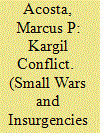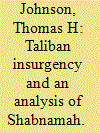|
|
|
Sort Order |
|
|
|
Items / Page
|
|
|
|
|
|
|
| Srl | Item |
| 1 |
ID:
080113


|
|
|
|
|
| Publication |
2007.
|
| Summary/Abstract |
In an effort to better understand the benefits and limitations of an authoritarian approach to counter-insurgency, this article examines the relationship between regime type and military effectiveness in the often neglected case of Soviet counter-insurgency operations in Western Ukraine. This study finds that the advantages authoritarian governments enjoy in designing, planning and implementing counter-insurgency campaigns - related to a lack of restraints and constraints - can all too easily become reversed through the excesses they permit.
|
|
|
|
|
|
|
|
|
|
|
|
|
|
|
|
| 2 |
ID:
080112


|
|
|
|
|
| Publication |
2007.
|
| Summary/Abstract |
This article examines the rising contention between a global foreign policy promoting liberal democracy in the Middle East and Islamist rejectionism. It provides a sociopolitical analysis of the phenomena of radical Islamist politics while focusing on the experience of Hezbollah in Lebanon. It associates the growth of Hezbollah, a political movement seen in various forms in several countries, with social class dynamics that have been antagonised by social inequality, opportunistic leadership, the importation of Western-ordered democracy and by perceived foreign intervention. By examining the root dynamic of Hezbollah in Lebanon, this article argues that poverty has provided the fertile ground for the growth of Islamic populism as a revolutionary movement and has represented a major reason for the rejection of democratisation and political reform. A global foreign policy that seeks to uproot extremism in favour of state-building and the advancement of democracy in the Middle East needs to be reoriented so as to help undermine class inequality and to strengthen government-sponsored public services programmes for the underclass
|
|
|
|
|
|
|
|
|
|
|
|
|
|
|
|
| 3 |
ID:
080111


|
|
|
|
|
| Publication |
2007.
|
| Summary/Abstract |
In 1999 India and Pakistan engaged in a limited war in the Himalayan peaks of Kashmir. Pakistani irregulars occupied territory in the Indian-held district of Kargil. A campaign that lasted 74 days and cost each side more than 1,000 casualties concluded with India in control of the commanding heights around Kargil. The conflict exposed flaws in the Indian armed forces as well as enduring truths of combat in the high mountains. Political constraints combined with the unforgiving environment and a determined enemy to diminish India's military advantage. Transition from counterinsurgency to high-intensity combat in the Himalayas proved to be a daunting task. Early failure was only overcome through innovation and adaptation to the environment. Specialised forces, unconventional techniques and the focused application of overwhelming firepower ultimately secured victory
|
|
|
|
|
|
|
|
|
|
|
|
|
|
|
|
| 4 |
ID:
080108


|
|
|
|
|
| Publication |
2007.
|
| Summary/Abstract |
Politicians, political pundits, and others focus a lot of attention on the political militias in Iraq, usually blaming them for their destabilising effect on the country and insisting that they disband. This study examines the impact that the militias in Iraq have on the Iraqi government's ability to consolidate control over its territory by first explaining how militias rose to prominence in Iraq during the power vacuum created by Saddam Hussein's ousting, then analysing the many ways militias adversely impact the security situation. The study then examines the other side of the argument - that is, why militias enjoy so much support in Iraq among their constituencies, and why they may actually be necessary to achieve stability in Iraq in the short term
|
|
|
|
|
|
|
|
|
|
|
|
|
|
|
|
| 5 |
ID:
080115


|
|
|
|
|
| Publication |
2007.
|
| Summary/Abstract |
This report provides a short overview of Pushtun tribalism, how it impacts leadership and how it is affected by Islam and Islamic Fundamentalism. It briefly details the Pushtuns' historical background, geographic location and tribal dynamics, and also explores recent impacts on the degradation and distortion of the traditional Pushtun leadership triangle. Included is reasonably in-depth discussion of the traditional dispute resolution mechanisms and their degradation, a brief description of Islamic influences on the Pushtuns (Wahhabism, Deobandism, Ahl-e Hadith, etc) and a depiction of some contracts between Islam and the Pushtunwali. Also included are several text boxes, outlining information on the Kuchis and the Tribal Confederacies. A brief and explicit conclusion presents the Pushtuns as xenophobic, and foreigners as an affront to their honour
|
|
|
|
|
|
|
|
|
|
|
|
|
|
|
|
| 6 |
ID:
080109


|
|
|
|
|
| Publication |
2007.
|
| Summary/Abstract |
In this paper, we examine the current state of knowledge in the economics literature on the conduct of reconstruction activities in Iraq and Afghanistan. As stabilisation and reconstruction missions grow in importance for units deployed to these regions, it becomes more important to understand what activities can promote economic growth at the local level. While military operations focus on interdicting the insurgency, successful counter-insurgency campaigns have typically addressed the conditions conducive to the insurgency. Mitigating the incentives for individuals to participate in an insurgency is imperative. Well-crafted and timed reconstruction activities can, we argue, attenuate these incentives
|
|
|
|
|
|
|
|
|
|
|
|
|
|
|
|
| 7 |
ID:
080107


|
|
|
|
|
| Publication |
2007.
|
| Summary/Abstract |
The Taliban has recently re-emerged on the Afghan scene with vengeance. Five years after being defeated in Afghanistan by a US coalition, the resurgent Taliban, backed by al-Qaeda, are mounting an increasingly virulent insurgency, especially in the east and south, near the Afghanistan-Pakistan border. The Taliban now represents a significant challenge to the survival of President Hamid Karzai's government. This article assesses the narrative strategy the Taliban has employed to garner support with the Afghan people. Specifically, this paper assesses the narratives of Taliban shabnamah, commonly referred to as 'night letters' in an effort unravel what the Taliban represents
|
|
|
|
|
|
|
|
|
|
|
|
|
|
|
|
| 8 |
ID:
080114


|
|
|
|
|
| Publication |
2007.
|
| Summary/Abstract |
This article seeks to compare Australia's involvement in two key 1990s peace missions: those to Somalia in 1992-93 and Rwanda in 1994-95. While there are many similarities between the two missions in terms of time, scale and theatre, the differences are more important. Both missions are usually recalled as failures despite the Australian troops having been extremely successful in their roles during both deployments. Moreover the experiences with intervention in Africa seem to have forever blighted Australian participation in peace missions on that continent.
|
|
|
|
|
|
|
|
|
|
|
|
|
|
|
|
| 9 |
ID:
080110


|
|
|
|
|
| Publication |
2007.
|
| Summary/Abstract |
After a half century of inaction, NATO intervened in Yugoslavia on behalf of Kosovar Albanians. Methodologically speaking, the action represents a new way of making war in the wake of the Cold War's conclusion. A dramatic increase in the politicisation of warfare, which has manifested itself through political campaigns to sell war to the people, is visible in how the US and key NATO allies justified action in 1999. The campaign to sell the war brought together both emotional appeals to alleviate humanitarian suffering and realist dilemmas aimed at preventing wider conflict. Learning from history, I argue that the war against Yugoslavia unfolded as it did because of the political events of the 1990s and, that by understanding that series of events, we can better predict what future conflicts might look like
|
|
|
|
|
|
|
|
|
|
|
|
|
|
|
|
|
|
|
|
|